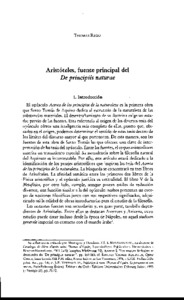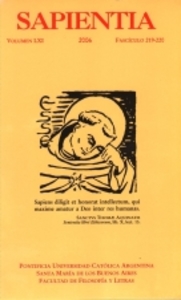Por favor, use este identificador para citar o enlazar este ítem:
https://repositorio.uca.edu.ar/handle/123456789/12119| Campo DC | Valor | Lengua/Idioma |
|---|---|---|
| dc.contributor.author | Rego, Thomas | es |
| dc.date.accessioned | 2021-08-19T10:38:06Z | - |
| dc.date.available | 2021-08-19T10:38:06Z | - |
| dc.date.issued | 2006 | - |
| dc.identifier.citation | Rego, T. Aristóteles, fuente principal del De principiis naturae [en línea]. Sapientia. 2006, 61 (219-220). Disponible en: https://repositorio.uca.edu.ar/handle/123456789/12119 | es |
| dc.identifier.issn | 0036-4703 (impreso) | - |
| dc.identifier.uri | https://repositorio.uca.edu.ar/handle/123456789/12119 | - |
| dc.description.abstract | Resumen: En este estudio probamos que la fuente principal del De principiis naturae de Santo Tomas de Aquino es Aristóteles. El método elegido es una exhaustiva comparación lineal entre el opúsculo y tres libros de Aristóteles —Física A y B y Metafísica A—. La búsqueda de las fuentes del opúsculo en términos de temática, argumentaciones, expresiones y aun ejemplos revela la deuda contraída con los libros A y B de la Física y, en menor medida, con el libro A de la Metafísica de Aristóteles. Este estudio nos muestra que, por un lado, el De principiis naturae ha sido redactado como un resumen de los primeros dos libros de la Física de Aristóteles, omitiéndose las críticas a los antiguos filósofos, pero logrando así realizar una presentación de las tesis fundamentales de la filosofía de la naturaleza. Por otro lado, también mostramos que a este resumen Santo Tomás ha agregado una presentación de la analogía en el último capítulo, basándose en Metafísica. | es |
| dc.description.abstract | Abstract: In this study we prove that the main source of St. Thomas Aquinas's De principiis naturae is Aristotle. The chosen method is an exhaustive linear comparison between the opuscule and three books of Aristotle —Physics A and B and Metaphysics A—. The search of the opuscule's sources in terms of subject matters, argumentations, expressions and even examples reveals how much is owed to Books A and B of Physics and, to a lesser extent, to Book A of Metaphysics of Aristotle. This study shows us that, on the one hand, De principiis naturae has been written up like a summary of the first two Books of Aristotle's Physics, omitting the critics to the old philosophers, but thus managing to make a presentation of the fundamental theses of the philosophy of the nature. On the other hand, we also show that to this summary St. Thomas has added a presentation of the analogy in the last chapter, being based on Metaphysics. | es |
| dc.format | application/pdf | es |
| dc.language.iso | spa | es |
| dc.publisher | Pontificia Universidad Católica Argentina. Facultad de Filosofía y Letras | es |
| dc.rights | Acceso abierto | * |
| dc.rights.uri | http://creativecommons.org/licenses/by-nc-sa/4.0/ | * |
| dc.source | Sapientia. 2006, 61 (219/220) | es |
| dc.subject | Aristóteles, 384-322 a.C. | es |
| dc.subject | FISICA | es |
| dc.subject | METAFISICA | es |
| dc.subject | Tomás de Aquino, santo, 1225-1274 | es |
| dc.subject | TOMISMO | es |
| dc.subject | FILOSOFIA ANTIGUA | es |
| dc.subject | FILOSOFIA DE LA NATURALEZA | es |
| dc.title | Aristóteles, fuente principal del De principiis naturae | es |
| dc.type | Artículo | es |
| uca.disciplina | FILOSOFIA | es |
| uca.issnrd | 1 | es |
| uca.affiliation | Fil: Rego, Thomas. Pontificia Universidad Católica Argentina; Argentina | es |
| uca.affiliation | Fil: Rego, Thomas. Pontificia Universitas Lateranensis; Italia | es |
| uca.version | publishedVersion | es |
| item.fulltext | With Fulltext | - |
| item.languageiso639-1 | es | - |
| item.grantfulltext | open | - |
| Aparece en las colecciones: | SAP - 2006 Vol LXI nro. 219-220 | |
Ficheros en este ítem:
| Fichero | Descripción | Tamaño | Formato | |
|---|---|---|---|---|
| aristoteles-fuente-principal.pdf | 562,04 kB | Adobe PDF |  Visualizar/Abrir | |
| sapientia219-220.pdf.jpg | 25,57 kB | JPEG |  Visualizar/Abrir |
Visualizaciones de página(s)
128
comprobado en 30-abr-2024
Descarga(s)
508
comprobado en 30-abr-2024
Google ScholarTM
Ver en Google Scholar
Este ítem está sujeto a una Licencia Creative Commons

